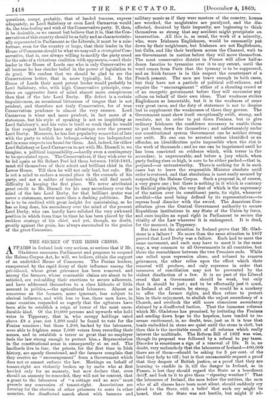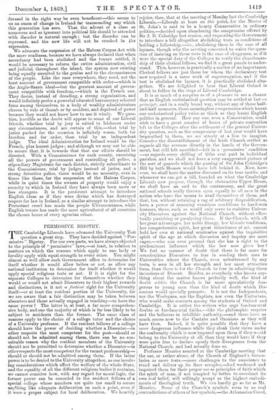THE SECRET THE IRISH CRISIS.
AFFAIRS in Ireland look very serious, so serious that if Mr. Gladstone summons Parliament and proposes to suspend the Habeas Corpus Act, he will, we believe, obtain the support of an undivided House of Commons. The Fenian leaders, exasperated by the rapid decay of their influence among the priesthood, whose great grievance has been removed, and among the farmers, whose reasonable claims are about to be satisfied, are redoubling their exertions to secure adherents, and have addressed themselves to a class hitherto of little account in politics,--the agricultural labourers. Almost as numerous as the farmers, more ignorant, less subject to clerical influence, and with less to lose, these men have, in some counties, responded so eagerly that the agitators have been able to establish a reign of terror of the most unen- durable kind. Of the 10,000 persons and upwards who hold votes in Tipperary, that is, who occupy holdings rated above £8 a year, not 1,200 could be found to vote for the Fenian nominee ; but those 1,200, backed by the labourers, were able to frighten some 7,000 voters from recording their names, and to establish a terror so great that no employer feels the law strong enough to protect him.. Representation in the constitutional sense is consequently at an end. The landlords live in fear, the priests, for the first time in Irish history, are openly threatened, and the farmers complain that they receive no " encouragement" from a Government which does not or cannot enforce the law. Meetings on behalf of tenant-right are violently broken up by mobs who at first howled only for an amnesty, but now declare that, even should an amnesty be conceded, they will not be content, that a grant to the labourers of "a cottage and an acre" must precede any concession of tenant-right. Associations are forming for the election of other prisoners to seats in other
military music as if they were masters of the country, houses are wrecked, the magistrates are paralyzed, and the dis- affected, deceived by their impunity, are beginning to think themselves so strong that any accident might precipitate an insurrection. All this is, as usual, the work of a minority, who, were Irishmen Englishmen, would be summarily put down by their neighbours, but Irishmen are not Englishmen, but Celts, and like their brethren across the Channel, wait to. see Government in motion before they will move themselves. The most conservative district in France will allow half-a-- dozen fanatics to tyrannize over it to any extent, until the word comes from Paris that the tyranny is to be suppressed, and an Irish farmer is in this respect the counterpart of a French peasant. The men are brave enough in both cases, but they have not a particle of political self-reliance, and require the " encouragement " either of a shouting crowd or of an energetic government before they will encounter any odium on behalf of their own ideas. That weakness strikes. Englishmen as lamentable, but it is the weakness of some very great races, and the duty of statesmen is not to despise. but to supplement the weaknesses of those they govern. The Government must show itself exceptionally swift, strong, and resolute, not in order to pat down Fenians, but to give ordinary Irishmen the confidence necessary to enable them to put them down for themselves ; and unfortunately under our constitutional system Government can be neither strong nor swift. No one can be arrested unless identified as an offender, an identification quite impossible when the riot is the work of thousands ; and no one can be imprisoned until he has been convicted on evidence which, with terror in the ascendant, is unprocurable, and before a jury which, when. party feeling rises so high, is sure to be either packed—that is, perjured—or untrustworthy. There is nothing for it in such. cases but to leave the responsible Minister absolute until. order is restored, and that absolutism is most easily secured by suspending the Habeas Corpus. Such a proposal is, of course, a very grave one ; but there is nothing in it which is contrary to Radical principles, the very first of which is the supremacy of the nation over its constituent parts, its right, whenever needful—the need being defined by its representatives—to. repress local disorder with the sword. The American Con- stitution gives the Central Government authority to secure Republican institutions in any State of the Union by force, and ours implies an equal right in Parliament to secure the vitality of the Law wherever it is endangered. It is dead, for the moment, in Tipperary.
Bnt does not the situation in Ireland prove that Mr. Glad- stone is a failure ? No more than the same situation in 1867 proved that Lord Derby was a failure. Each had to meet the
OF same movement, and each may have to meet it in the same way, a way common to all Governments in all countries, but there the resemblance between the two Premiers ends. While one relied upon repression alone, and refused to remove grievances, the other relies upon the effect which their- removal will produce, and only represses in order that measures of conciliation may not be prevented by the violent disaffection of a few. It is no part of the Liberal creed that a Government should be weak, but only that it should be just ; and to be effectually just it must, in Ireland at all events, be strong. It would be a mockery to offer the farmer rights, and then refuse to protect him in their enjoyment, to abolish the unjust ascendancy of a Church, and overlook the still more obnoxious ascendancy claimed by a disaffected faction. That the immense reforms- which Mr. Gladstone has promised, by irritating the Fenian& and sending down hope to the hopeless, have tended to in- crease excitement, is, no doubt, true, just as it is true that toads embedded in stone are quiet until the stone is cleft, but then this is the inevitable result of all reforms which really interest the multitude. The Reform Bill of 1832 was wise, though its proposal was followed by a refusal to pay taxes. Disorder is sometimes a sign of a renewal of life. It is, no doubt, very melancholy that the labourers of Ireland-400,000' there are of them—should be asking for 3 per cent. of the land they help to till ; but is that unreasonable request a proof that they despair of British justice, or a proof that they are learning to confide in it, till the danger in Ireland, as in. France, is lest they should regard the State as a beneficent dell?, and look to it to give them "ripening weather I" That the labourers of Ireland, the men below the cottiers, the men who of all classes have been most silent, should suddenly cry aloud to the State, with a belief that such cry might be counties, the disaffected march about with banners and heard, that the State was not hostile, but might if ad-
dressed in the right way be even beneficent—this seems to us an omen of change in Ireland far transcending any which this generation has seen. That the advent of a class so numerous and so ignorant into political life should be attended with disorder is natural enough ; but the disorder can be repressed, and the new life will not be crushed in the repression. We advocate the suspension of the Habeas Corpus Act with the more readiness, because we have always declared that when ascendancy had been abolished and the tenure settled, it would be necessary to reform the entire administration, civil
and judicial, unsuited to the genius and t the island, athnesyn the circumstances tannronwn existing being equally a of the people. Like the race everywhere, they need, not the least amount of government compatible with order—which is the Anglo-Saxon ideal—but the greatest amount of govern- ment compatible with freedom,—which is the French one. They desire, instead of dreading, a strong organization, and would infinitely prefer a powerful educated bureaucracy selected from among themselves, to a body of wealthy administrators chosen by rule of thumb or by accident, and deprived of power because they would not know how to use it wisely. We ques- tion, horrible as the doubt will appear to some of our Liberal friends, whether trial by jury is suited to Irishmen under any circumstances, and are certain of this,—that trial by juries packed for the occasion is infinitely worse, both for freedom and for order, than trial by an independent judge. The ideal Administration for Ireland would be the French, plus honest judges ; and although we may not be able to secure that, it is towards that that our efforts should be directed. With a Commissioner for each county, exercising all the powers of government and controlling all police, a stipendiary Magistrate for each district, strictly subordinate to the Commissioner, trial by judges instead of juries, and a strong detective police, there would be no necessity, even in times like these, for the suspension of the Habeas Corpus, while in quiet times the owners of property would enjoy a security to which in Ireland they have always been more or less strangers. It is the persistent attempt to introduce English ideas as if they were divine which has destroyed respect for law in Ireland, as a similar attempt to introduce the Protestant creed has made the people Ultramontanes, while English tenure has made the most agricultural of all countries the chosen home of every agrarian crime.



































 Previous page
Previous page